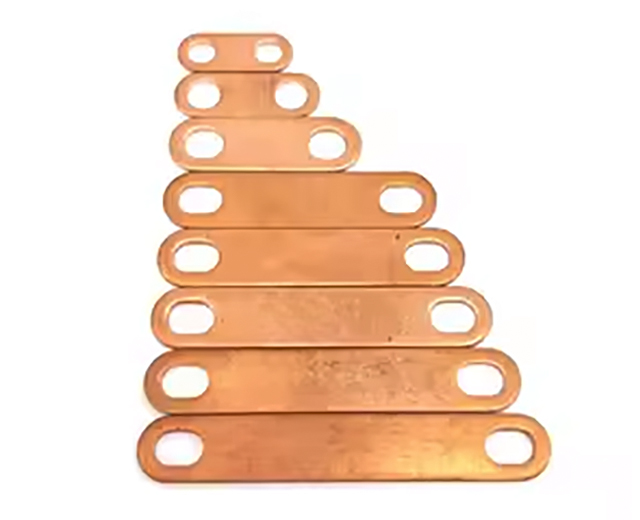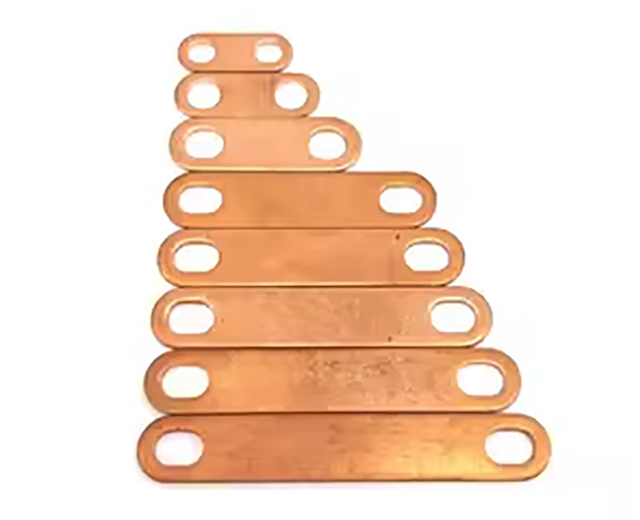

A Copper Connector Busbar is an essential electrical component that facilitates efficient electrical current flow by connecting various parts within power distribution systems. Constructed from high-purity copper, these Busbars ensure optimal conductivity and mechanical strength, significantly reducing energy loss and improving system reliability.
The copper Busbar connector plays a pivotal role in modern electrical switchgear, battery systems, and renewable energy applications, where secure and stable electrical connections are crucial.

Superior Electrical Conductivity: Crafted from premium copper grades such as T2 and C11000, achieving conductivity levels ≥ 97% IACS, ensuring minimal resistive losses.
Robust Mechanical Strength: The copper connector busbar exhibits excellent tensile strength and durability, capable of withstanding high current loads and mechanical stress.
Customizable Design: Custom sizes, shapes, hole patterns, and plating options available to suit diverse installation needs and optimize system layouts.
Advanced Surface Treatments: Tin plating, nickel plating, and silver plating improve corrosion resistance, solderability, and electrical performance, extending service life.
Precision Machining: CNC punching and cutting ensure accurate hole alignment for easy, reliable installation and maintenance.
Flexible and Rigid Options: Choose between rigid copper busbar connectors for fixed installations or flexible copper connector busbars designed for applications requiring vibration absorption and thermal expansion flexibility.
Our copper connector busbars undergo a meticulous manufacturing process designed to meet the highest industry standards:
Material Selection: High-conductivity copper such as T2 (GB standard) or C11000 (ASTM standard) is sourced for purity and performance.
Cutting & Shaping: Precision cutting, bending, and forming tailored to customer specifications, ensuring exact fit and reliable operation.
Hole Punching: CNC machining of mounting and connection holes tailored for bolts, screws, or other fastening methods.
Surface Finishing: Application of plating coatings such as tin, nickel, or silver to enhance surface protection and electrical contact quality.
Quality Control: Rigorous inspection including conductivity tests, dimensional verification, and plating adhesion tests to guarantee product reliability.
Copper connector busbars are extensively used across various sectors that require dependable power distribution:
Electrical Switchgear and Distribution Panels: Facilitating stable electrical connections within control cabinets.
Power Generation Plants and Substations: Handling high current transmission efficiently.
Renewable Energy Systems: Including solar power arrays and wind turbines, where robust and corrosion-resistant connectors are critical.
Battery Packs and UPS Systems: Providing reliable connections in energy storage and backup power.
Industrial Automation and Machinery: Ensuring uninterrupted power supply to critical equipment.
Premium Material Quality: We only utilize the highest quality electrolytic copper to ensure top-tier electrical conductivity and durability.
Tailored Solutions: Offering fully customized copper busbar connectors based on your detailed drawings and project needs.
Competitive Pricing: Optimized production processes enable us to provide high-quality copper connector busbars at market-competitive prices.
On-Time Delivery: Efficient production scheduling and logistics management guarantee timely delivery worldwide.
Technical Support: Our experienced engineering team provides expert guidance on busbar design, installation, and maintenance.
Q1: What materials are used to manufacture copper connector busbars?
A: Copper connector busbars are typically made from high-purity electrolytic copper, such as T2 or C11000 grades, to ensure excellent electrical conductivity and mechanical strength.
Q2: What distinguishes a copper connector busbar from an aluminum connector?
A: Copper connector busbars have superior electrical conductivity and corrosion resistance compared to aluminum, making them ideal for high-performance and long-term reliability applications.
Q3: Can copper connector busbars be customized?
A: Absolutely. We provide customization services including specific dimensions, hole patterns, plating types, and mechanical design adjustments to meet project-specific requirements.
Q4: What are the common surface treatments for copper busbar connectors?
A: Common surface treatments include tin plating (for improved solderability), nickel plating (for enhanced wear resistance), and silver plating (for superior conductivity).
Q5: How do copper connector busbars benefit renewable energy systems?
A: They provide reliable, corrosion-resistant electrical connections that ensure efficient power transmission in solar, wind, and other renewable energy installations.
Q6: What is the installation process for copper connector busbars?
A: Installation involves securely fastening the busbar connectors with bolts or screws through pre-punched holes, ensuring firm and conductive connections in electrical panels or equipment.
Q7: How is the quality of copper connector busbars ensured?
A: We conduct strict inspections including conductivity measurements, mechanical strength testing, and surface coating adhesion to meet international standards and customer expectations.